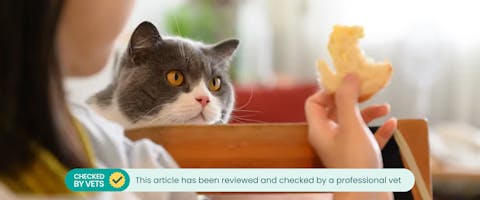Updated 10/05/2023
Picture the scene: you’re settling down for breakfast with a slice of thick, warm fresh bread in front of you. Sounds delicious, right? And maybe your cat thinks so too - as you notice, from the corner of your eye, a tentative paw coming towards you…
It’s a familiar scene for many pet parents! But, have you ever considered can cats eat bread? And more importantly, is bread safe for cats?
While our feline friends are certainly a fan of kneading - and loafing! - bread may not be the healthiest food for our kitties to chow down on. So, if you’ve ever been tempted to share your sourdough avo toast with Felix, you might want to take a read of this article first as we explore the question: can a cat eat bread?
Trending posts
Purr-use some of the top blogs our members have been loving this month- Top male dog names for your new furry friendGot a new furry family member in your pack? Check…

- Top female dog names for your new fluffy palWelcoming a new pooch into your family? Explore…

- 250+ gray cat names your silver feline will loveRecently welcomed a fluffy gray bundle of joy into…

- What are normal pet sitting rates?Discover the average pet sitting rates for animals…

- Unique dog names to stand out from the packDare to be different with our list of the best…

Is bread poisonous to cats?
In most cases, bread is not poisonous to cats - but there are some caveats.
While most plain, cooked bread is perfectly safe for your kitty to consume, an important exception to this rule is uncooked bread. Uncooked, raw dough can be incredibly dangerous to cats - it can expand in your cat’s stomach and lead to a build up of gas, resulting in painful bloating at best - at worst, it can even be fatal. The yeast used in bread dough also produces carbon dioxide and ethanol alcohol - which poses another potential danger.
If kitty is eyeing up your morning brunch, you may be tempted to share it with them - but be aware that some breads also contain a higher amount of yeast, such as sourdough. So, for the same reasons, the answer to 'can cats eat sourdough bread?' is also a definite no. Signs of yeast ingestion include bloating, vomiting, diarrhoea and collapse. If your cat has eaten raw dough, or yeast-containing products, seek veterinary advice urgently.
You should also take care to avoid breads that contain added ingredients, such as xylitol or chocolate (both of which are toxic to both cats and dogs), or are flavoured with seasonings such as garlic or onions, which are toxic to cats. Toppings, such as butter, chocolate spread and peanut butter should also be avoided, as they are often high in fats and some may contain ingredients toxic to cats.
Is bread good for cats?
In short - no! While it's fine and perfectly safe for cats to consume a small amount of plain, cooked bread, bread certainly isn't a healthy choice for cats. It’s high in calories, high in carbs, and offers zero nutritional benefits to cats.
As obligate carnivores, cats get all the nutrients they need from animal sources, and don't require many carbohydrates in their diet. So, your cat would fare much better by following a complete and balanced diet that meets all of their nutritional needs.
(With the occasional healthy cat treat, of course).
Feeding your cat bread
While your kitty may have a hankering for a tasty slice of toast, in general it's best to avoid giving your cat bread.
If you do choose to feed your kitty some bread - for example, to use it as a vehicle to sneak in some medication - you should tear up pieces of plain bread into small, bite-size pieces, and stick to plain, cooked bread.
Remember, when feeding your cat a new food it is always a good idea to talk to your vet first, and monitor your cat for any signs of gastrointestinal problems (such as vomiting, diarrhea, or constipation) - particularly if you have a cat with a sensitive stomach. Always give novel foods in very small portions, to ensure no bad reactions.
Meet our veterinary expert, Lizzie
This article has been checked by veterinarian Lizzie Youens BSc (Hons) BVSc MRCVS. Lizzie graduated from the University of Bristol in 2011, and has been working in first opinion companion animal practice. She has worked in a variety of clinics across the UK, from large hospitals to small branch practices. She enjoys doing a mixture of medicine, surgery and emergency work. Lizzie currently works in a small rural practice where she enjoys working in a close-knit community.
What other foods are safe for cats?
From one breakfast food to another: next up, discover if cats can eat eggs - after all, eggs and bread go paw-in-paw. Or, for even more kitty cuisine facts, check out our complete guide to what cats can and can’t eat right here.

